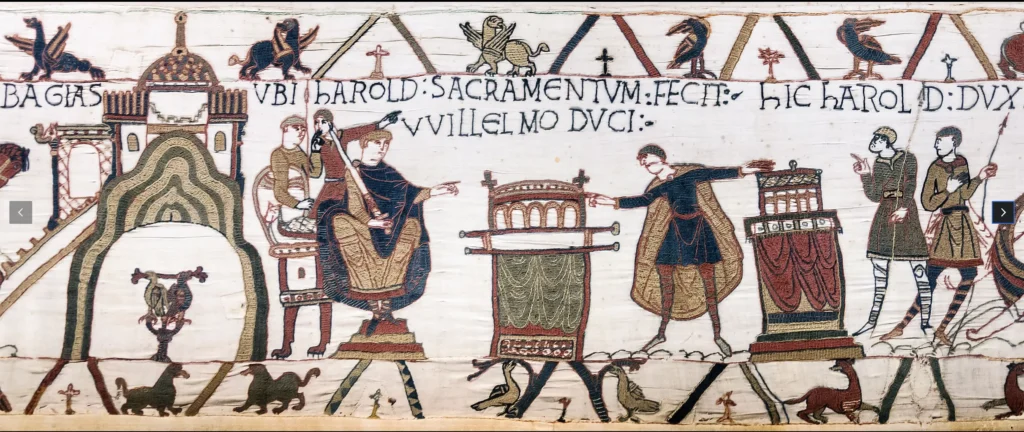French vocabulary permeates English to a remarkable degree, with estimates suggesting that 25-30% of English words derive from French origins. This profound linguistic connection traces back to the Norman Conquest of England in 1066, when William the Conqueror and his Norman forces fundamentally altered the trajectory of the English language. For centuries following this pivotal moment, French served as the language of England’s nobility, government, and legal system, while Anglo-Saxon English remained the tongue of ordinary people. This linguistic division created a unique blending that demonstrates the profound French influence on English vocabulary that continues to shape how we speak today.
For historical context about this transformative period, see the Encyclopaedia Britannica overview of the Norman Conquest.
The Norman Conquest: when French became England’s prestige language
The Norman invasion didn’t just change English politics—it revolutionised the language itself. From 1066 onwards, French became the language of power, spoken in royal courts, written in legal documents, and used in religious ceremonies. This linguistic hierarchy persisted for nearly 300 years, during which thousands of French words entered the English vocabulary.
Interestingly, this created a social stratification that is still observable today. Words for livestock often come from Anglo-Saxon (cow, pig, sheep), while the corresponding meat terms derive from French (beef from bœuf, pork from porc, mutton from mouton). This reflects the social reality: English-speaking farmers raised the animals, while French-speaking nobles ate the prepared dishes.
Common English words with surprising French origins
Many everyday English words trace back to French sources, often through centuries of linguistic evolution that have obscured their origins:
Basic vocabulary:
- Table (from table)
- Chair (from chaire)
- City (from cité)
- Village (from village)
- Justice (from justice)
- Travel (possibly from travailler, though this etymology remains debated)
Structural words: Even fundamental words like they (ils/elles), very (related to vrai), and people (peuple) show French influence, demonstrating how deeply this linguistic borrowing penetrated English.
Time and measurement:
- Hour (heure)
- Minute (minute)
- Second (seconde)
- Calendar (calendrier)
French culinary vocabulary: the foundation of fine dining
French influence on English food terminology extends far beyond fancy restaurant menus. This reflects France’s historical reputation for culinary sophistication and the Norman elite’s dining customs:
Basic food terms:
- Soup, salad, dessert (borrowed directly from French)
- Sauce (sauce)
- Cream (crème)
- Sugar (sucre)
French specialties maintaining their names:
- Baguette, croissant, soufflé
- Champagne, cognac, bourguignon
- Hors d’oeuvres, canapé, amuse-bouche
Cooking techniques:
- Sauté, gratin, purée
- Braise, flambé, julienne
- Marinade, roux, reduction
The word restaurant itself comes from the French verb restaurer, meaning “to restore”—originally referring to establishments that served restorative broths.
Government and legal terminology: the Norman administrative legacy
Perhaps nowhere is French influence on English vocabulary more systematic than in English legal and governmental vocabulary. For centuries, laws were written in French, court proceedings conducted in French, and administrative documents drafted in French. This legacy persists in modern English:
Court system:
- Court (cour)
- Judge (juge)
- Jury (juré)
- Attorney (atourné)
- Bailiff (baillif)
Legal concepts:
- Crime (crime)
- Felony (félonie)
- Plaintiff (plaignant)
- Defendant (défendant)
- Evidence (évidence)
Government structure:
- Parliament (parlement)
- Government (gouvernement)
- Minister (ministre)
- Chancellor (chancelier)
- Treasury (trésorerie)
This French legal vocabulary explains why English legal language can seem so formal and removed from everyday speech—it literally comes from a different linguistic tradition.
Art, culture, and sophistication: French words that add elegance
French cultural prestige has continued to influence English well beyond the medieval period. French terms in art, fashion, and intellectual life often carry connotations of sophistication and refinement:
Arts and entertainment:
- Ballet (classical dance form)
- Theatre (théâtre)
- Literature (littérature)
- Genre (genre)
- Critique (critique)
Fashion and style:
- Couture, chic, boutique
- Lingerie (lingerie)
- Perfume (parfum)
- Elegant (élégant)
Untranslated French phrases: English speakers frequently use French expressions without translation:
- Déjà vu, faux pas, savoir-faire
- Café, fiancé, protégé
- Avant-garde, joie de vivre, raison d’être
The continuing influence: modern French borrowings
French influence on English vocabulary didn’t end in the Middle Ages. Modern borrowings continue, particularly in:
Technology and innovation:
- Entrepreneur (entrepreneur)
- Sabotage (sabotage)
- Reconnaissance (reconnaissance)
Modern cuisine:
- Nouvelle cuisine, fusion, terroir
- Sommelier, maitre d’, chef de cuisine
Why French-English cognates can be tricky
While sharing common origins helps English speakers learn French vocabulary, it also creates spelling traps. Many words look similar but have subtle differences that can catch even experienced speakers off guard. For detailed examples of these tricky word pairs, see our guide to French-English cognates and their spelling challenges.
The lasting impact on English structure and style
The French influence on English vocabulary extends beyond individual words to affect English sentence structure, pronunciation patterns, and stylistic conventions. This explains several features of modern English:
Why English spelling is complex: English combines Germanic spelling patterns with French-influenced pronunciation and word structures, creating the notorious irregularities that challenge learners.
Register and formality: French-derived words often sound more formal or sophisticated than their Germanic equivalents (commence vs. start, purchase vs. buy, residence vs. home).
Professional and academic vocabulary: Fields like medicine, law, and academia rely heavily on French and Latin-derived terminology, creating a linguistic divide between everyday speech and specialized discourse.
Understanding our linguistic heritage
The French influence on English vocabulary reveals more than etymological curiosities—it illuminates the complex history of cultural contact, social stratification, and linguistic evolution. This Norman legacy helps explain why English became such a versatile language for international communication, combining Germanic directness with Romance sophistication.
Today, as English serves as a global lingua franca, it carries with it this rich French heritage, making it a bridge between different linguistic traditions and a testament to the lasting power of cultural exchange.
Related reading: Ten French untranslatable words that you will love.

